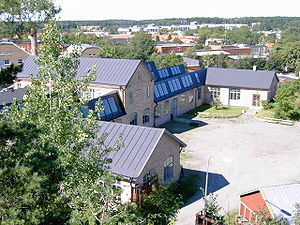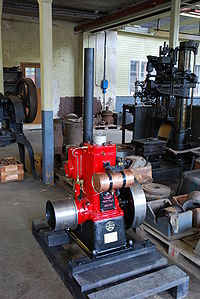
Pythagoras Mechanical Workshop Museum
Encyclopedia


Norrtälje
Norrtälje is a locality and the seat of Norrtälje Municipality, Stockholm County, Sweden with 17,275 inhabitants in 2010.- History :Norrtälje traces its history to 1219, when the location was first mentioned as Tälje. After some time, the name officially became Norrtälje, to separate it from the...
in the province of Uppland
Uppland
Uppland is a historical province or landskap on the eastern coast of Sweden, just north of Stockholm, the capital. It borders Södermanland, Västmanland and Gästrikland. It is also bounded by lake Mälaren and the Baltic sea...
in Sweden. At the museum, production facilities and working conditions from the first half of the 20th century are on display. The factory produced hot bulb engine
Hot bulb engine
The hot bulb engine, or hotbulb or heavy oil engine is a type of internal combustion engine. It is an engine in which fuel is ignited by being brought into contact with a red-hot metal surface inside a bulb....
s and spare parts for them from 1908 up to closure of the workshop in 1979. The engine factory is an industrial heritage site, complete with functioning production lines and offices.
The company was founded in 1898 as Verkstads AB Pythagoras (Pythagoras Mechanical Workshop Ltd.), originally to produce mechanical calculators, hence its name from the Greek mathematician and philosopher Pythagoras
Pythagoras
Pythagoras of Samos was an Ionian Greek philosopher, mathematician, and founder of the religious movement called Pythagoreanism. Most of the information about Pythagoras was written down centuries after he lived, so very little reliable information is known about him...
. However, these plans failed and the factory in stead started producing locks, brass candlesticks and electrical fittings. Beginning in 1908 hot bulb engines were designed and manufactured, and such engines afterwards dominated the production line of the Pythagoras factory.
After a bankruptcy in 1927 the company was reconstituted as Nya AB Pythagoras (New Pythagoras Ltd.). A new bankruptcy followed during the Depression in 1933, but it was reorganized once more. From 1957 and onwards, under new owners, the production was step by step reduced.
Pythagoras manufactured hot bulb engines under the trademarks of Fram and Drott, the latter for export markets. The engines were used in farm machinery and on fishing and other vessels. The company was, with about 80 employees, once the largest manufacturer in Norrtälje.
The factory was threatened by demolition in the early 1980s, but was rescued by a group of local enthusiasts. Nowadays the Pythagoras Engine Factory is recognized as one of the most valuable industrial heritage monuments in Sweden.. The Pythagoras Mechanical Workshop Museum is owned by the Engine Factory Pythagoras Foundation, which runs it in cooperation with the support group Pythagoras Vänner (The Friends of Pythagoras).
Further reading (in Swedish)
- Dag Avango: Motorfabriken Pythagoras – En levande verkstadsindustri och kulturmiljö, 1998, ISBN 91-630-6394-2
- Jan-Bertil Schnell: ”Motorfabriken Pythagoras, ett törnroseslott i Roslagen”, in the 1993 yearbook of the Swedish Tourist Association

